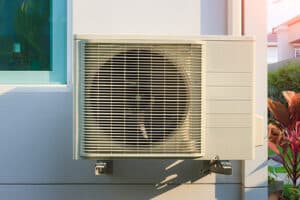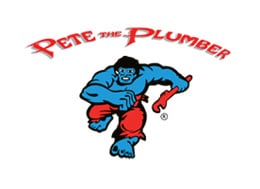
As summer takes a grip in Calgary, we’re likely to be sweating it out a few times over the coming months.
While we’re not known for our palm trees and tropical sandy beaches, the temperatures can get up there, so homeowners often get clobbered with a heavy electricity bill due to the air conditioning.
Oscillating fans and opening a window just don’t make much of a difference, so the air conditioning takes a hammering. AC is generally a huge electricity guzzler so it can really inflate the monthly energy bill.
Whether you have a split system, packaged central air conditioning or a portable AC system, here are some air conditioning tips for summer so that you can keep your home comfortable without losing the shirt off your back!
Choosing the right AC size for your home
 If you install a central air conditioning system in your home, make sure that it is fit for the job you want it to do.
If you install a central air conditioning system in your home, make sure that it is fit for the job you want it to do.
The capacity of air conditioning units is measured in BTUs (British Thermal Units). This is the amount of heat required to raise the temperature of one pound (0.45 kilograms) of water one-degree Fahrenheit (0.56 degrees Celsius).
While lower BTU units are cheaper to buy, they may be a false economy. If your system is not powerful enough to cool the room(s) it is intended for, it will be working overtime and guzzling more electricity than needed.
Units that are too big will waste upfront costs, waste electricity costs, and may increase repair costs. They pump out more cold air than necessary and continuously shut off and turn back on, which leads to lower efficiency and it may wear out your unit quicker too.
To save money on your air conditioning bill, be sure to measure the size of the rooms you wish to cool and take note of the room’s aspect (is it north- or south-facing?). Then speak to an air conditioning specialist for guidance on the size of units you need for adequate cooling.
How many square feet will 10,000 BTU heat?
As a general rule, a typical split air conditioner for a small room might be rated at 10,000 BTU. Larger rooms will have units of 12,000 – 14,000 BTU and a central system for the whole house might be 60,000 BTU.
For rooms with standard eight-foot ceilings, you can use the following as a guideline (noting that sunny rooms with poor insulation or heat-producing appliances will require more cooling):
8,000 BTU is adequate for 200 sq. ft.
10,000 BTU is adequate for sq. ft.
12,000 BTU is adequate for 400 sq. ft.
13,000 BTU is adequate for 450 sq. ft.
14,000 BTU is adequate for 500 sq. ft.
Note that you will also see an EER rating on your system in addition to BTU. This is the Energy Efficiency Ratio (the BTU rating over its wattage).
You want this number to be as high as possible (at least 10 or 11 as a guideline) but the higher the EER the steeper the price, in general.
Portable air conditioner tips
Some homes in Calgary use portable air conditioning units. After all, we only have a few months of hotter weather here usually, so these units can be conveniently stowed away for most of the year.
The same sizing rules apply to the BTU guidelines detailed above. Make sure that you choose a unit that is large enough to cool the room(s).
Choose the right placement for your AC
Split air conditioning systems
It’s important to place the compressor/condenser (the part of the unit that discharges the warm air from your home) in a shady spot outside your home with plenty of room around it.
Remove all shrubbery and plants, so that the unit can do its job properly.
The evaporator part of the unit, which is inside the room, should be placed as centrally as possible in the room you want to be cooled.
Portable Air Conditioners
The hot air must be exhausted from the hose (or hoses) so they are often plugged in near a window. Most models come with a window kit to expel the warm air outside. Make sure that the cooled air is not obstructed by furniture or draperies.
It’s not just the units themselves that require the right placement. Make sure that your thermostat is on the right wall too.
If you place your thermostat on a wall next to a hot window, the room will appear hotter than it actually is. That means your air conditioner will be asked to work more often than it needs to and this adds to the electricity bill.
5 expert tips for preparing an energy-efficient home
 Most Canadians are quite environmentally aware. We enjoy spending time outdoors in our backyard, do not want to use energy unnecessarily, and many of us have taken measures to make our homes energy-efficient.
Most Canadians are quite environmentally aware. We enjoy spending time outdoors in our backyard, do not want to use energy unnecessarily, and many of us have taken measures to make our homes energy-efficient.
The added benefit of this, of course, is that it can save on your electricity bills.
Before installing AC units, thought should go into how you can prepare your home for minimizing electricity consumption with your AC.
Here are a few good ideas…
Protect your home from the sun
Keep your AC bills down by ensuring that your house is not unnecessarily heated during the day. Plant shady trees and shrubs outside the windows of the main rooms that get the sun, which is normally the south-facing ones.
Make sure you have full-length curtains (drapes) or shades fitted for the hottest rooms in the house and keep them drawn or down when you are not using those rooms during the summer.
Awnings on the windows of the sunny side of your home can also help keep the heat out in summer. If you’re repainting, lighter colours are best as they reflect sunlight rather than absorb it, though in winter you might appreciate the warming effect.
Seal all the leaks
You don’t want to cool the whole neighbourhood – just your home, right?
Insulating your home from energy leaks just makes good sense. Why pay unnecessarily for electricity that is just escaping anyway?
Seal all the places where air leaks out and this will help to keep cool air in. You can add weatherstripping to drafty doors and windows for starters.
Make sure you seal or caulk the places where utilities (plumbing, electricity, dryer vents) enter and exit your home.
Chimneys are another common place for escaping energy. If there are cracks, seal them. This will not only save air conditioning bills but also heating bills in winter.
Use fans as well as AC
Energy-efficient ceiling fans are effective at cooling on less-hot days. Some summer days in Calgary don’t require AC at all but they could use the cooling effect of a fan.
Fans can be used with air conditioning too. You may be able to raise the temperature setting on the AC control by a few degrees and save the high AC electricity costs.
Using a ceiling fan can make a room feel 10 degrees cooler while using 10 percent of the energy of a central air conditioner. Some ‘smart’ fans can even be operated by apps now.
Ensure attic ventilation
Thirty percent of the heat in your house is absorbed through the roof. Make sure that you have adequate ventilation in the attic and use ridge vents or attic fans to reduce cooling costs.
Remember, any heat that enters your home will need to be removed by the cooling system in summer. With flat roofing being common in Calgary, make sure you have proper insulation or have a Calgary roofing company properly insulate your roof.
With this being Calgary and our weather suffering the extremes, you will need to balance your heating needs in the summer with your cooling needs in the winter.
Avoid generating heat
Electrical appliances generate heat, which must be removed from your home by the cooling system. Ensure that appliances are energy-efficient and switched off when not in use to avoid raising the ambient temperature unnecessarily.
Turn off lights, computers, printers, etc. when you’re not using them.
Air conditioner maintenance tips
Finally, a quick word about air conditioner maintenance.
You should ensure that your air conditioning system is cleaned at least once per year, in the springtime before the hot weather arrives.
Filters will need to be cleaned, so a full service is a good idea. If you want to be really proactive, change your filters monthly when the system is in use.
Good maintenance of your system can keep electricity bills manageable and also prolong its life.
Want to save on your AC bill this summer?
At Pete The Plumber, our skilled and experienced technicians can help with air conditioning system installation, repair, and maintenance in Calgary and the surrounding area.
We’re happy to discuss how you may be able to reduce your energy bills this summer. Get in touch on (403) 257-1766.

